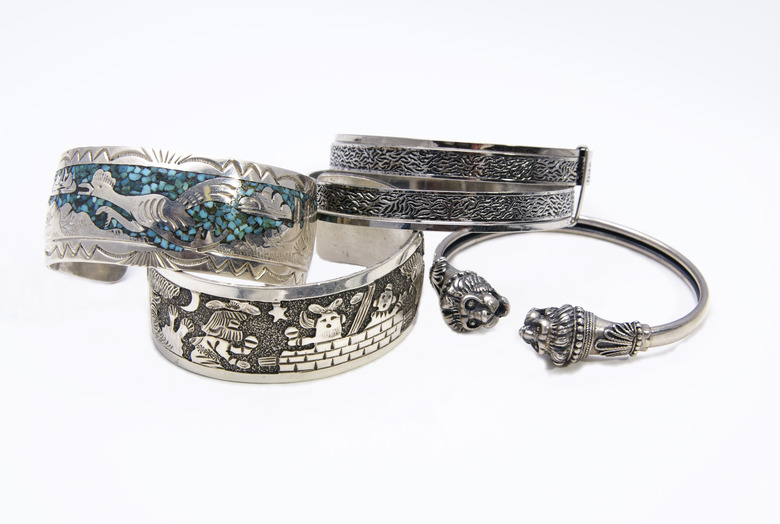How To Clean Sterling Silver With Lemon Juice
Tarnish makes your sterling silver jewelry or serving utensils look dirty, even though they aren't. The problem occurs because of the silver's reaction to items that contain sulfur or oxygen in the air. Instead of using caustic chemicals to clean silver, turn to ingredients from nature for greener options. Lemons contain citric acid, a natural cleaning agent powerful enough to make sterling silver items shine, often without even having to polish them.
How Lemon Juice Works
How Lemon Juice Works
Citrus acid is effective in removing the oxidation that occurs on sterling silver; it also removes hard-water stains, lime deposits, calcium and rust by breaking the bond between them and the surface of the item. The citric acid in lemon juice is a natural chelating agent – it traps and removes heavy metal ions – which is why it's often included as an ingredient in manufactured products for cleaning metal. Fresh lemon juice works best because the acid is at its strongest, but bottled lemon juice is effective as long as it hasn't reached its expiration date.
Tools Needed
Tools Needed
To avoid creating chemical reactions with other metals, mix the ingredients in glass bowls or containers; avoid using stainless steel. Don't wear latex or rubber gloves as these contain sulfur — also found in mayonnaise, eggs, mustard, wool or onions — which causes sterling silver to discolor and tarnish. Use microfiber cloths or cotton flannel fabrics to dry and polish the silver. To get into crevices and detailed areas, use a baby toothbrush with your chosen lemon juice cleaner.
The Soaking Method
The Soaking Method
Combine 1 tablespoon of fresh lemon juice with 1/2 cup of instant dry milk and 1 1/2 cups of water in a glass bowl. Soak your items overnight in the mixture. In the morning, rinse with cool water and wipe dry with a soft microfiber or cotton flannel cloth. Double or triple the ingredients, if necessary, to accommodate larger silver pieces.
The Paste Method
The Paste Method
Create a paste with 1 part baking soda and 4 parts lemon juice — fresh or from a bottle — in a glass bowl. Dip a lint-free cloth in the solution and rub it on the sterling silver teapot or jewelry item. Wipe the entire item with the homemade paste; when you're finished, rinse with clean water and wipe dry with a different clean cloth. Lemon juice, like vinegar, reacts with baking soda by generating bubbles that can effectively clean an item if left to soak it in for a few minutes, as well. Use the mixture immediately, as its effectiveness wears off quickly once it quits bubbling.
Olive Oil and Lemon Juice
Olive Oil and Lemon Juice
Combine 1 teaspoon of olive oil and 1/2 cup lemon juice in a large glass bowl large enough that you can place a small microfiber cloth in it to soak up the homemade cleaning solution. Wring out the cloth after it is wet and use the cloth to the polish the silver. Rinse the silver items in clean water and dry with another clean microfiber or cotton flannel cloth.
Words of Caution
Words of Caution
Do not clean opaque gemstone jewelry with lemon juice; the acid in the juice affects certain gemstones. Pearls, for example, may disintegrate in contact with the citric acid in lemon juice. The grade of the silver also affects how quickly it tarnishes; sterling silver rated at .950 tarnishes easily because it's purer.
Don't clean silver-plated items or fine silver with anything abrasive — such as salt and lemon juice or by using baking soda paste — as this can damage the silver. Silver craftsmen often include oxidation as part of the design in areas with intricate details to give depth and shading to the silver item. Use caution when cleaning these areas to avoid removing the oxidation that was meant to be part of the design. Too much cleaning with lemon juice removes artist-intended oxidation from sterling silver pieces.
